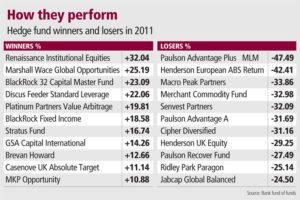HEDGE funds are losing much of their lustre, proving as vulnerable as their conventional counterparts to the global downturn.
The vast majority of hedge funds lost money in 2011 despite the sales spin that they are good alternative investments during bear markets.
According to Hedge Fund Research’s daily HFRX indices, the Global Hedge Fund Index fell by 8.9 per cent in 2011, following a rise of 5.2 per cent in 2010. Equity hedge funds that take bull and bear positions in shares tumbled by 19.1 per cent after rising by 9 per cent the previous year.
Instead of thriving in volatile conditions as expected and profiting from buying during dips and selling in rallies, most managers in the $2 trillion US, Europe and Asian hedge fund business did not justify their hefty fees – usually one to 2 per cent in annual management fees and 20 per cent in performance fees, which are not returned when funds lose money.
A small minority of funds did well, such as Renaissance Institutional Equities with a rise of 32 per cent and Marshall Wace Global Opportunities with a gain of 25.2 per cent.
The cliche that past performance may not be repeated could be applied to hedge fund managers who were feted during their better periods.
Former hedge fund star John Paulson, who made huge gains from making bearish bets on sub-prime mortgages, attracted billions into his fund. Last year, however, his main fund, Paulson Advantage Plus, tumbled by 51 per cent. The Paulson Advantage fund fell by 36 per cent, and the Paulson Gold fund that invests in bullion and gold shares fell by 11 per cent.

According to hedge fund sources, such disappointing performances have led disenchanted investors to withdraw their money from the industry in droves. Still, despite the redemptions, there is still around US$2 trillion invested in hedge fund assets.
Shares of Man Group, the largest independent hedge fund manager with US$65 billion under management, slid to a 52 week low of 112 pence. During the 2007 hedge fund boom, the shares hit 640 pence. Analysts downgraded the shares on expectations that there would be more withdrawals from the group.
Asian hedge funds also suffered. The biggest losers year to end November, according to a fund of funds manager that invests in hedge funds, were Chilton China Opportunities, down 22.2 per cent, SR Global (-20.3 per cent), Corevest Partners (-19.2 per cent), Boyer Allan Pacific (-18.7 per cent), and HT Asian Catalyst (-10.6 per cent).
In defence, hedge fund managers complained that they were ‘whipsawed’ by extraordinary intraday movements, especially when the European crisis worsened.
Investors, however, contend that these traders are paid large fees because they are supposed to be savvy and sophisticated and should be able to cope in all environments.
The industry has also come under intense regulatory scrutiny. The insider trading conviction of hedge fund manager Raj Rajaratnam has made managers much more cautious.
The US Securities and Exchange Commission is now applying sophisticated technology to detect whether managers are not valuing their funds accurately.
As part of the initiative to combat hedge fund fraud by identifying abnormal investment performance, the SEC announced enforcement actions against three firms and six individuals in December for misconduct including improper use of fund assets, fraudulent valuations, and misrepresenting fund returns.
